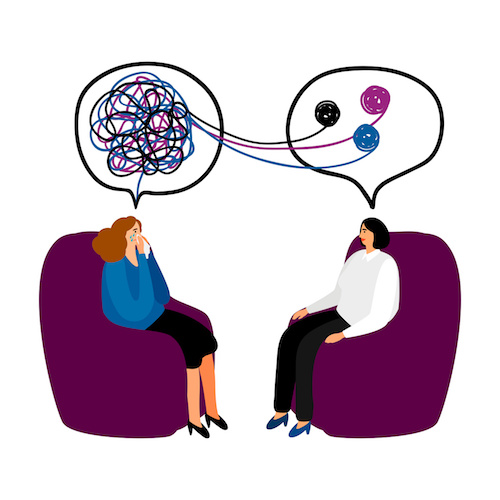Unlocking the Secrets of Mental Health: A Summary of Therapy and Therapy Choices
Mental wellness is a facility and vital facet of total well-being. Numerous counseling and therapy options exist to deal with different psychological obstacles. Each method supplies distinct advantages and approaches customized to individual needs. Recognizing these options is important for anyone seeking to boost their psychological health and wellness. Couples Therapy. What aspects should one consider when discovering these opportunities? The answer might reveal a path to a much healthier mood
Recognizing Mental Wellness and Its Value
Mental health incorporates the emotional, emotional, and social wellness of individuals, considerably affecting just how they assume, really feel, and act. Its significance can not be overemphasized, as it impacts every element of life, consisting of connections, work performance, and general lifestyle. Individuals with excellent psychological wellness often tend to deal with anxiety better, keep much healthier connections, and make educated choices. Conversely, inadequate psychological health and wellness can result in emotional distress, impaired functioning, and various mental conditions, which might call for expert treatment. Understanding psychological health and wellness is necessary for recognizing the indicators of distress and the need for assistance. Awareness additionally advertises compassion and lowers stigma, motivating individuals to seek aid when required. By focusing on mental health and wellness, communities can cultivate atmospheres that support psychological health, eventually causing healthier, a lot more resilient people. This structure acts as a vital action towards reliable mental wellness therapy and treatment alternatives.
Kinds Of Counseling Strategies
Counseling approaches differ widely, each tailored to satisfy the unique demands of people seeking support. Among the most typical kinds are cognitive-behavioral therapy (CBT), which concentrates on determining and transforming negative idea patterns, and person-centered treatment, which highlights compassion and approval. Psychodynamic therapy explores past experiences and unconscious procedures to comprehend current behavior, while solution-focused quick treatment aims to determine solutions instead than investigate problems.Additionally, family members therapy addresses relational dynamics and interaction within households, fostering healthier communications. Group therapy supplies a common area for participants to share experiences and support each other. Various other techniques consist of existential therapy, which encourages people to discover definition and function, and art or songs therapy, which makes use of creative expression as a therapeutic tool. Each method offers distinctive strategies and viewpoints, enabling clients to find the most appropriate approach for their personal development and healing journeys.
Discovering Different Therapy Methods
In the domain name of mental wellness counseling, various therapy modalities offer distinct approaches to treatment. Cognitive Behavior Treatment highlights the link between ideas and actions, while Psychodynamic Treatment checks out unconscious influences on psychological health. In Addition, Mindfulness-Based Techniques advertise present-moment understanding as a way to enhance psychological policy and total mental health and wellness.
Cognitive Behavioral Therapy
Cognitive Behavior Modification (CBT) sticks out as one of the most commonly practiced and investigated techniques in psychological health therapy. This approach concentrates on the affiliation between feelings, actions, and ideas, emphasizing that altering adverse thought patterns can lead to enhanced emotional wellness and behavioral modifications. CBT is structured, generally entailing a limited variety of sessions, and intends to equip individuals with practical abilities to manage their symptoms. It works for a selection of conditions, consisting of anxiety disorders, depression, and post-traumatic stress problem. By making use of techniques such as cognitive restructuring and direct exposure therapy, CBT fosters durability and equips customers to challenge challenges head-on, making it a beneficial choice in the landscape of mental health treatments.
Psychodynamic Therapy Strategies
Psychodynamic therapy approaches provide a deep exploration of the unconscious mind and its influence on behavior and psychological wellness. Rooted in Freudian concept, these methods emphasize the significance of early childhood years experiences and unconscious disputes. With strategies such as free association, dream evaluation, and transfer, individuals get understanding right into their sensations and thoughts, fostering self-awareness and understanding. This therapeutic modality urges customers to reveal quelched emotions and unsettled concerns, which can be crucial in dealing with current psychological challenges. By examining the interaction between existing actions and previous experiences, psychodynamic treatment aims to advertise psychological healing and individual growth. Inevitably, it gives a structure for individuals to check out intricate inner dynamics that affect their mental wellness.

Mindfulness-Based Methods
While traditional therapies typically concentrate on previous experiences, mindfulness-based strategies prioritize present-moment recognition as a path to psychological health. These methods, consisting of mindfulness-based cognitive therapy (MBCT) and mindfulness-based tension reduction (MBSR), urge individuals to engage fully with their thoughts and feelings without judgment. Professionals find out to observe their psychological states, cultivating a better understanding of psychological triggers and reactions. This practice not only minimizes signs and symptoms of stress and anxiety and depression but additionally boosts general mental resilience. By integrating mindfulness workouts, such as meditation and deep breathing, clients cultivate a feeling of peace and clearness. Inevitably, mindfulness-based strategies encourage individuals to navigate life's obstacles with increased awareness and approval, promoting a much healthier partnership with their thoughts and emotions.
The Duty of a Specialist or Counselor
A knowledgeable specialist or therapist plays an important duty in supporting people with their mental health and wellness journeys. They provide a secure, non-judgmental area where clients can reveal their ideas and sensations openly. Couples Therapy. By employing different therapeutic techniques tailored to every individual's demands, specialists aid customers check out underlying problems that may add to their mental wellness challenges.Therapists use guidance and tools to deal with anxiety, anxiety, clinical depression, and other psychological difficulties. Their training equips them to recognize patterns in actions and thought procedures, helping with insights that bring about personal development. They also promote a strong healing alliance, which is crucial for effective outcomes.Moreover, therapists remain dedicated to confidentiality and ethical standards, guaranteeing a relying on environment. Eventually, the function of a therapist or therapist is to encourage people, encouraging them to establish strength and much healthier coping strategies while guiding via life's complexities
How to Choose the Right Therapy or Therapy Choice
Selecting the appropriate counseling or therapy alternative starts with reviewing specific requirements. It is necessary to comprehend individual difficulties and objectives prior to discovering numerous treatment designs. This foundational action can considerably affect the efficiency of the picked strategy.
Analyze Your Needs

How can people properly examine their mental health requires when reviewing therapy or therapy choices? Initially, they ought to assess their psychological state and identify particular concerns, such as partnership, anxiety, or stress and anxiety difficulties. Journaling can be a beneficial device for tracking thoughts and sensations gradually. Furthermore, people might take advantage anchor of seeking responses from relied on friends or member of the family regarding viewed adjustments in behavior or state of mind. It is additionally useful to evaluate personal goals for treatment, such as improving coping skills or getting understanding right into personal patterns. Finally, researching numerous counseling methods and their viability for particular demands can aid in making an informed choice. Ultimately, self-awareness plays a critical duty in selecting the ideal course for mental health and wellness support.
Check Out Treatment Designs
While traversing the diverse landscape of treatment choices, individuals need to think about different styles of counseling to discover the best fit for their one-of-a-kind requirements. Cognitive Behavior Modification (CBT) focuses on transforming adverse thought patterns, while Psychodynamic Treatment checks out past experiences and unconscious processes. Humanistic techniques emphasize personal development and self-actualization, cultivating a supportive setting. Additionally, mindfulness-based therapies grow present-moment recognition, aiding emotional regulation. For those looking for framework, Solution-Focused Short Treatment targets particular objectives and services. Team treatment offers a common setup for common experiences and support. Ultimately, individuals should certainly reflect on their preferences, convenience levels, and certain challenges, guaranteeing they select a healing style that resonates with their personal trip toward psychological well-being.
Getting Over Obstacles to Seeking Help

The Benefits of Therapy and Treatment for Psychological Health
Looking for aid for mental health challenges can bring about substantial improvements in overall health. Therapy and treatment provide individuals with a risk-free space to explore their thoughts and feelings, fostering self-awareness and personal growth. These professional services equip customers with dealing approaches and analytic abilities tailored to their find out here distinct situations.Moreover, therapy can decrease symptoms of anxiety, anxiety, and other mental health disorders, boosting emotional durability. Routine sessions promote accountability and encourage individuals to establish and attain personal goals. Through numerous restorative methods, such as cognitive-behavioral therapy or mindfulness methods, customers discover to reframe unfavorable ideas and establish healthier behaviors.Additionally, the therapeutic connection itself can be a resource of assistance, assisting to deal with isolation and solitude. On the whole, taking part in counseling and therapy is an aggressive action toward accomplishing mental wellness, enabling individuals to lead even more meeting lives.
Regularly Asked Concerns
For How Long Does Therapy or Therapy Usually Last?
The duration of therapy or therapy differs significantly, often lasting from a few sessions to a number of months or years. Elements influencing this consist of the individual's specific demands, the kind of therapy, and healing goals.
What Should I Expect During My Initial Session?
During the very first session, people can expect an intro, discussion of worries, and the specialist's technique. They may complete analyses and establish objectives, promoting a secure atmosphere for open interaction and structure rapport.

Are There Any Type Of Risks Related To Therapy?
Therapy can entail dangers, such as emotional pain, susceptability, or challenging unpleasant memories. While these difficulties may occur, they can likewise lead to individual growth and recovery, making the healing procedure facility yet possibly fulfilling.
Exactly How Can I Tell if My Specialist Is an Excellent Fit?
Identifying if a therapist is a good fit entails reviewing convenience, communication style, and restorative approach. Favorable connection and development towards goals are indications of a suitable suit, crucial for efficient mental health support.
Will My Insurance Policy Cover Counseling or Treatment Procedure?
Figuring out insurance coverage for counseling or treatment sessions commonly needs contacting the insurance policy provider directly. Plans vary substantially, so people must validate advantages, co-pays, and any required pre-approvals before seeking therapy solutions. Amongst the most common types are cognitive-behavioral treatment (CBT), which concentrates on determining and altering negative thought recommended you read patterns, and person-centered treatment, which highlights empathy and acceptance. Psychodynamic therapy checks out subconscious processes and past experiences to understand existing behavior, while solution-focused short treatment aims to recognize solutions rather than examine problems.Additionally, family members therapy addresses relational dynamics and interaction within family members, cultivating healthier communications. Various other methods include existential therapy, which encourages individuals to locate significance and objective, and art or music treatment, which makes use of imaginative expression as a healing device. Cognitive Behavioral Therapy emphasizes the connection between behaviors and ideas, while Psychodynamic Treatment explores unconscious influences on emotional wellness. Cognitive Behavior Treatment (CBT) concentrates on transforming adverse idea patterns, while Psychodynamic Treatment checks out unconscious processes and past experiences.